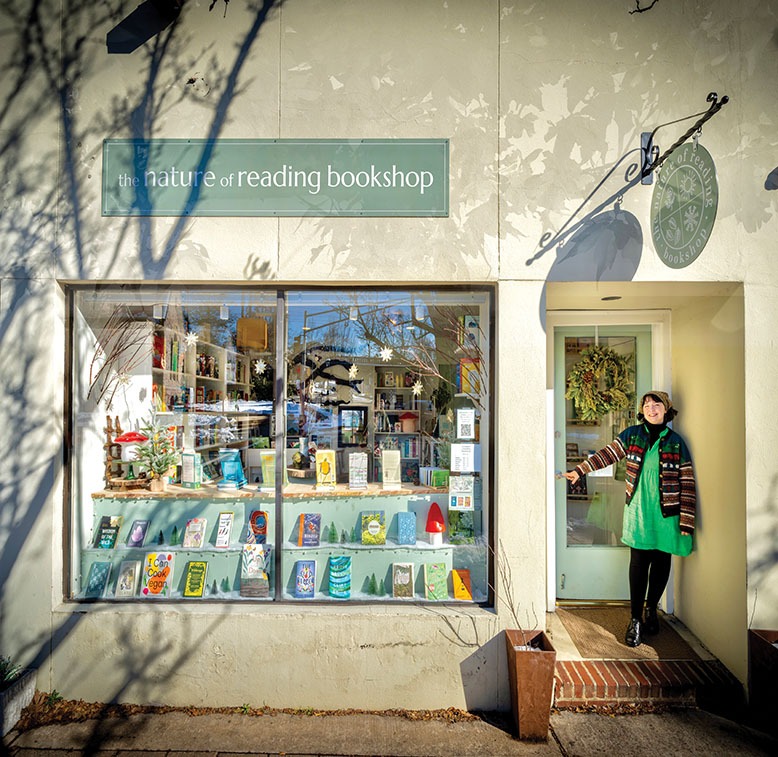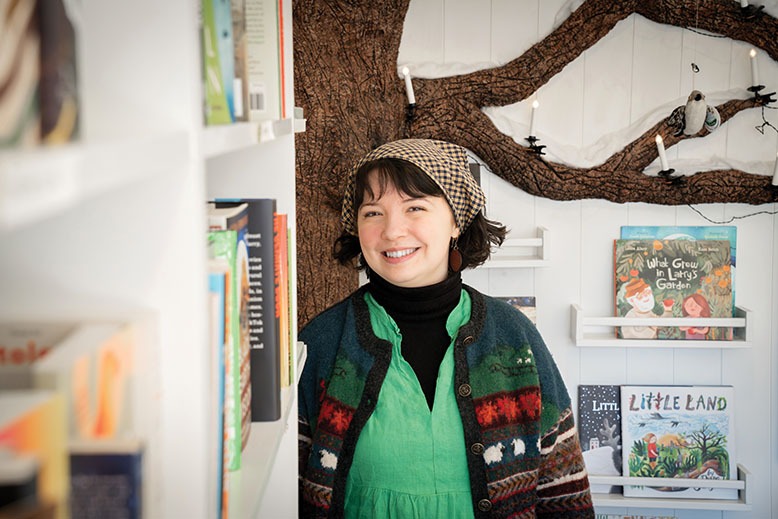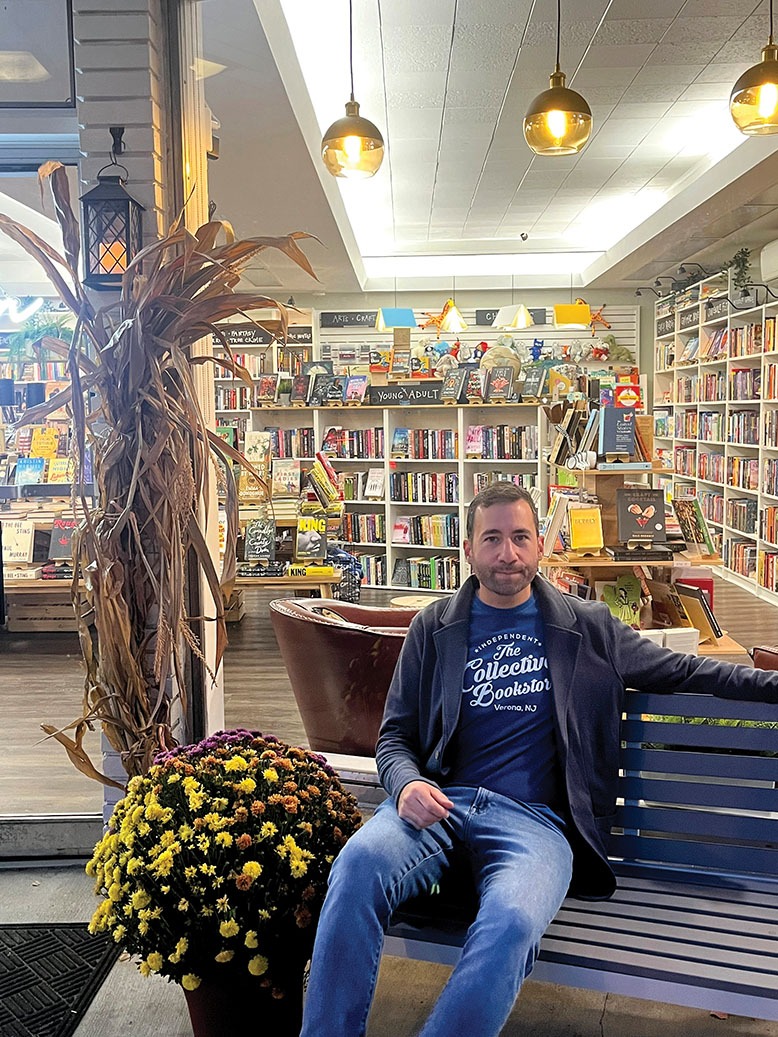
Hailey Brock fulfilled her dream of owning a bookstore when she opened the Nature of Reading Bookshop in Madison. Photo: Andy Foster
During the pandemic, when everyone was staying very close to home, many turned to the comfort of reading—and local bookstores played a key role in getting books to those readers. But they also did so much more.
In many ways, independent bookstores became the hearts of their communities, giving residents a reason to get out of their homes, while also offering them a way to stay informed and entertained.
In the last few years, that affection for indie bookstores has translated into many more of them opening nationally—including in New Jersey—with more people fulfilling their dreams of owning their own bookshops.
“I think indie bookstores, unlike other places, played a certain role for people during the pandemic, whether they were delivering books when people were shut down or writing handwritten notes on packages,” says Allison Hill, CEO of the American Booksellers Association (ABA), a nonprofit trade association that promotes independent bookstores.
Since the pandemic, the ABA has seen nearly 600 new independent bookstores open across the country, with its membership up 36 percent. New Jersey has had nearly half a dozen new bookstores open in the past year alone.

“The pandemic really motivated me [to open a bookstore] because I started thinking that the only guaranteed time we have is now,” Brock says. Photo: Andy Foster
The Chatham native, who now lives in Madison, had an internship at a bookstore while in high school and fell in love with bookselling. She earned her master’s degree in book history at the University of Edinburgh, and when she returned to the United States during the pandemic, she was trying to decide what kind of work she wanted to do.
“I thought about doing something like special collections or rare librarianship, but I always had in my head that I wanted to do something with bookselling or owning a bookstore,” she says. “And the pandemic really motivated me, because I started thinking that the only guaranteed time we have is now. So, while I originally saw bookstore ownership as this distant dream, the pandemic changed my perspective on life—so I decided to go for it earlier than I probably otherwise would have.”
Brock is now the proud owner of The Nature of Reading Bookshop, a tiny (merely 250 square feet) and adorable bookstore in Madison that specializes in books about nature, climate change, and what she calls seasonal reading—fiction and nonfiction books that align with each season. She also has books on subjects such as gardening, sustainable living, and flora and fauna.
“During the pandemic, I spent a lot of time reading about the climate crisis; before, it always gave me a lot of anxiety, but when everything changed so much during that time, I somehow became more able to read books about it and started thinking about actions to take and what I could do with my humanities background. And it just came to me one day that I should open a nature/climate change-themed bookstore,” she says.
Like many new bookshops, she started out with a pop-up at local farmers markets and craft fairs. She was able to open her permanent bookstore after a crowdfunding campaign helped her raise more than $14,000. To save money, she did much of the design and renovation of the shop herself, with the help of a family friend.
Brock says business has been good and having three colleges nearby has helped: Drew University, Fairleigh Dickinson University and Saint Elizabeth University. She also has three monthly book clubs that meet at her store, as well as nature-related arts-and-crafts classes that have been very popular.
Bookstores have become much more than just a place to buy books, says Hill, of the ABA.
“The thing about independent bookstores is that it’s not just about retail; there’s history and relationships. They became a community center and a gathering place. They’re supporting the schools, they’re bringing authors to the schools, they’re doing book drives for local charities,” she says. “During the holidays, people bump into other people they know there, and they know the booksellers. I think a lot of these bookstores offer communities continuity and connection.”
That’s definitely been the case at Watchung Booksellers in Montclair, a vibrant independent bookstore that has been in business for 28 years. Run by Margot Sage-El, the beloved shop recently expanded down the street, adding the Kids’ Room, a children’s-bookstore offshoot. Sage-El also brought her daughter, Madeleine Ciliotta-Young, on board to help run the business. The new space is also being used for the store’s popular book talks, story time and other events.
“Our events have really increased in popularity, partly because I feel like our audience is wider, but also because people are really looking for connections,” she says.
Those connections were especially important during the pandemic, when the bookstore rallied during a dark time, staying open when everything else had shut down and providing books and more for its loyal customers.
“We’ve always had an online presence, but it wasn’t even 0.01 percent of our business. And then all of a sudden, after that week in March 2020, I was waking up to a hundred online orders a day from all over the country. Because libraries had shut down and then Amazon paused and people were stuck at home. And then the schools shut down—everybody was trying to figure out how to make it work. So I think parents thought, At least if my kid’s reading, then they’re okay,” she remembers.
Customers would come to the store’s back door and pick up their books that were laid out on tables in paper bags; by that time, the bookstore had essentially been turned into a warehouse, she says.
“The community totally rallied behind us, and we survived. Our customers were extremely grateful (that we stayed open),” says Sage-El. “It was also an activity for them to go to the bookstore and pick up the books. If people wanted gifts or puzzles, they would come to the window and we’d show them the puzzles that we had, and they’d point and we would put it out for them.”
While that kind of above-and-beyond customer service definitely endears a local business to customers, bookshops must still contend with the stiff competition from Amazon, which usually offers lower prices on its books.
So why shop at a local bookstore instead of online?
Hill believes that, during the pandemic, people came to realize that if they didn’t support local businesses such as bookshops, they would close.
“People were homeschooling their kids or started reading with their kids again or just started reading again for pleasure,” she says. “Then we all had the experience of losing our favorite places in the pandemic, like our favorite restaurant or our favorite coffee shop. People went, ‘Wow, this is what happens when we don’t support these small businesses.’
“There’s a real economic advantage to a community supporting independent bookstores over Amazon. There’s also the displacement of retail shops,” she says.
She points to a 2022 report by the ABA and Civic Economics, a consultancy, showing that when you buy something from an indie bookstore, it generates twice the local economic activity compared to Barnes & Noble, and four times more than Amazon.
“So it’s everything from the local sales tax to local vendors staying in business,” she says.
Independent bookstores also help increase property values in a town by drawing people in, as they give residents a gathering place and a sense of community. “It becomes such a vibrant part of the fabric of a community, and it’s way more interesting for a town to have a bookstore than a Starbucks or Gap, right?” says Hill.
Since the pandemic, stores have begun opening up in places that were once considered book deserts—communities that didn’t have a bookstore and, in some cases, even a library.
In addition to the recently opened Nature of Reading and the Kids’ Room, new shops in New Jersey include Wolfe & Kron Books in Farmingdale, the Collective Bookstore in Verona and Chapter One in Mendham. In October, a new Barnes & Noble bookstore opened in Paramus, after having unceremoniously shuttered its location just up the highway after 28 years in business. The catch? The bookstore behemoth is now modeling its new, smaller digs on indie bookshops—specifically curating to engage the local community.
In another change, of the new bookshops opening across the country, about 28 percent are owned by people of color, Hill says.
“That’s been a big shift. It’s really interesting how the industry is diversifying. I think that partly reflects the overall demographics of the U.S., but I also think that the summer George Floyd was murdered ignited so much interest in not only books about anti-racism, but also books about people of color. It drove demand. Publishers started publishing more. And bookstores started creating spaces that centered on diverse voices. And we saw more diverse people enter into the industry as a result,” she says.
In July, The Collective Bookstore opened in Verona—the first independent bookshop to open in the town in decades. Joshua Jacobs, who owns the Hearth Realty Group at the same Main Street location, realized that he didn’t need a physical location for his business anymore, so he and his wife, Lauren, decided to open a bookstore there instead.

Bibliophile Joshua Jacobs opened the Collective Bookstore in Verona last year. Photo: Jacqueline Mroz
It’s a beautiful little bookshop, with a children’s reading section, light fixtures shaped like open books, and even a cozy sofa with a gas-powered fireplace next to it.
Jacobs, who lives in Verona with his wife and two children, says he’s passionate about the important role that bookstores play in a town. The response to the bookstore opening has been overwhelmingly positive, he says.
“I didn’t really expect the level of excitement that we’ve seen, and how much people were looking forward to us opening,” he says. “The community is extremely important to us, and people say they feel like it’s become a destination. We have the same families coming back on a regular basis. All of our staff members are always engaging with people that walk in. It’s so much more than just a store.”
Local bookstores also know their customers in a way that online sellers never will.
Sage-El and her fellow booksellers spend a lot of time talking to their customers and advising them on the perfect books for them to read and to give as gifts.
“There is the whole discoverability piece of having a local bookstore,” she says. “When we review the book catalogs from the publishers, we really look with our customers in mind and try to pick books that we think will be of interest to them—not just books that the publishers say will be the top books. We know our customers. Books are really personal, and you learn a lot about a person by what they’re looking for.”
Hill says local independent bookshops also add character to neighborhoods and connect people in a different kind of way.
That’s been the case with Watchung Booksellers, where they hold events such as author book readings and launches, story time, book clubs, and holiday celebrations.
Hill says these bookstores return to the ideal of knowing whom you’re buying things from.
“You know who the owners are—they’re your neighbors. They live in your community. They can be much more responsive to the interests and the needs of the community. You can get personal recommendations where they really know you. It’s not an algorithm telling you what to order,” she says.
“The independent bookstore is going to have that bookseller who fell in love with that debut novel. I think it’s way more meaningful to have those kinds of recommendation,” says Hill.
Reagan Arthur, publisher of Knopf, agrees that there are real advantages to shopping for books locally, including supporting your community intellectually, economically and culturally.
But from a publishing point of view, indie bookstores are often indicators of a book’s potential beyond what publishers have already told themselves a book can do.
“And so, months before a book is out, we’re getting notes from independent booksellers across the country,” she says. “Independent booksellers sell what they love. They are honest in their opinions, and they support the books that they believe in. Over time, it definitely adds up; you can point to a lot of books that were made by independent booksellers who recognized something early and then loved and championed it. Eventually, those books took off.”
No one knows New Jersey like we do. Sign up for one of our free newsletters here. Want a print magazine mailed to you? Purchase an issue from our online store.
